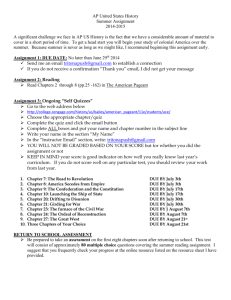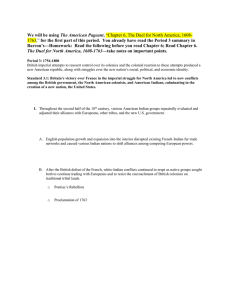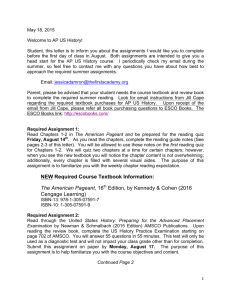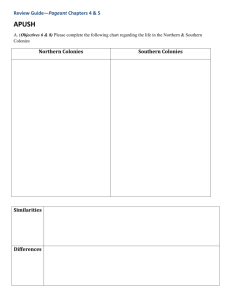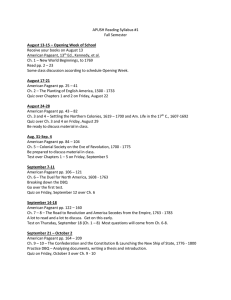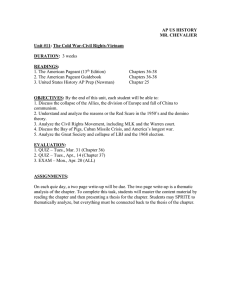American Pageant, Chapters 3, 4, 5 & 6
advertisement
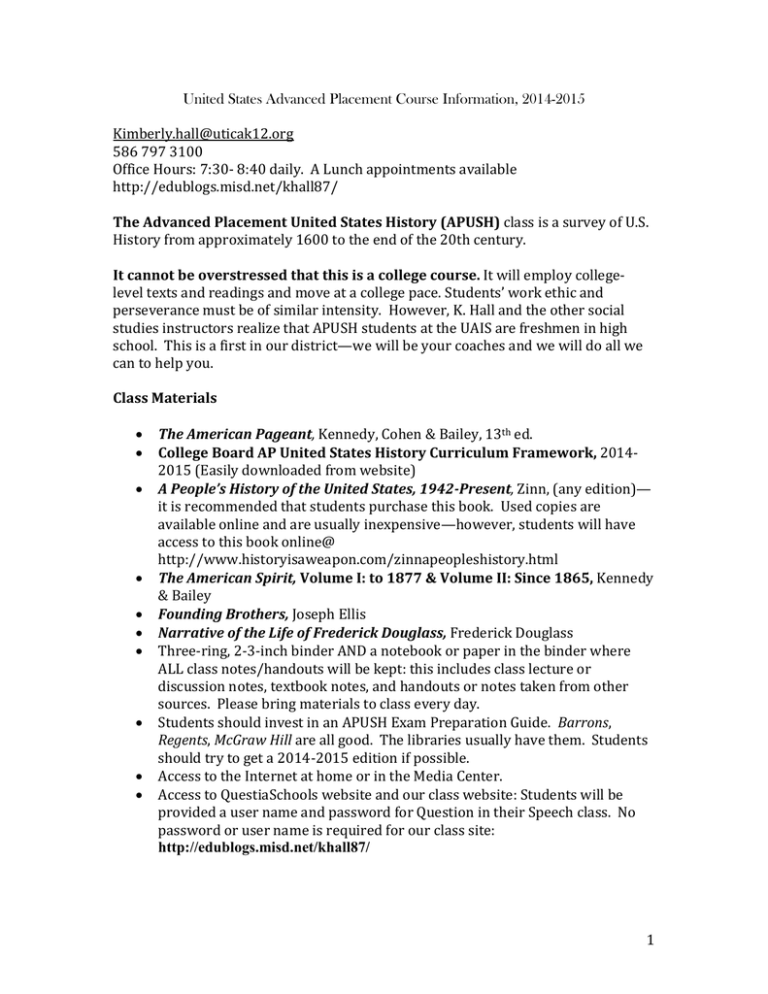
United States Advanced Placement Course Information, 2014-2015 Kimberly.hall@uticak12.org 586 797 3100 Office Hours: 7:30- 8:40 daily. A Lunch appointments available http://edublogs.misd.net/khall87/ The Advanced Placement United States History (APUSH) class is a survey of U.S. History from approximately 1600 to the end of the 20th century. It cannot be overstressed that this is a college course. It will employ collegelevel texts and readings and move at a college pace. Students’ work ethic and perseverance must be of similar intensity. However, K. Hall and the other social studies instructors realize that APUSH students at the UAIS are freshmen in high school. This is a first in our district—we will be your coaches and we will do all we can to help you. Class Materials The American Pageant, Kennedy, Cohen & Bailey, 13th ed. College Board AP United States History Curriculum Framework, 20142015 (Easily downloaded from website) A People’s History of the United States, 1942-Present, Zinn, (any edition)— it is recommended that students purchase this book. Used copies are available online and are usually inexpensive—however, students will have access to this book online@ http://www.historyisaweapon.com/zinnapeopleshistory.html The American Spirit, Volume I: to 1877 & Volume II: Since 1865, Kennedy & Bailey Founding Brothers, Joseph Ellis Narrative of the Life of Frederick Douglass, Frederick Douglass Three-ring, 2-3-inch binder AND a notebook or paper in the binder where ALL class notes/handouts will be kept: this includes class lecture or discussion notes, textbook notes, and handouts or notes taken from other sources. Please bring materials to class every day. Students should invest in an APUSH Exam Preparation Guide. Barrons, Regents, McGraw Hill are all good. The libraries usually have them. Students should try to get a 2014-2015 edition if possible. Access to the Internet at home or in the Media Center. Access to QuestiaSchools website and our class website: Students will be provided a user name and password for Question in their Speech class. No password or user name is required for our class site: http://edublogs.misd.net/khall87/ 1 Now let’s look at the fun stuff. . . Students should be familiar with these concepts: Each unit of study will address the concept questions as related to the time period 1. How has the American national identity changed over time? (Identity) 2. How have changes in markets, transportation, and technology affected American society? (Work, Exchange, and Technology) 3. How have changes in migration and population patterns affected American life? (Peopling) 4. How have various groups sought to change the federal government’s role in American political, social, and economic life? (Politics and Power) 5. How has U.S. involvement in global conflicts set the stage for domestic social changes? (America in the World) 6. How did the institutions and values between the environment and Americans shape various groups in North America? (Environment and Geography) 7. How have changes in moral, philosophical, and cultural values affected U.S. history? (Ideas, Beliefs, and Cultures) Objectives by Themes – CODES A. Identity (ID) B. Work, exchange, and technology (WXT) C. Peopling (PEO) D. Politics and Power (POL) E. America in the world (WOR) F. Environment and geography-physical and human (ENV) G. Ideas, beliefs, and culture (CUL) ADVANCED PLACEMENT HISTORICAL SKILLS STUDENTS NEED TO MASTER IN ORDER TO BE SUCESSFUL IN HISTORY CLASSES: 1. Skill I: Historical Causation-compare causes/effects analyze and evaluate multiple causes and effects, and distinguishing coincidence and correlation 2. Skill II: Patterns of Continuity and Change over Time-analyze and evaluate historical patterns of continuity and change over time 3. Skill III: Periodization-organizing events within blocks of time 4. Skill IV: Comparison-historical developments and processes across place, time, and societies 2 5. Skill V: Contextualization-specific events connect to broader regional, national, or process connect to other 6. Skill VI: Historical Argumentation-evaluate and synthesize conflicting historical evidence 7. Skill VII: Appropriate Use of Relevant Historical Evidence-use features such as audience, purpose, point of view, argument, limitations, etc.. 8. Skill VIII: Interpretation-analyze diverse historical interpretations 9. Skill IX: Synthesis-apply insights about the past or historical context Please become familiar with the following guiding concepts: These are our content standards. You will be graded on showing how well you learned and understand each concept. Period 1: 1491-1607 American Pageant Chapters 1 & 2—First Week Main Focus: On a North American continent controlled by American Indians, contact among peoples of Europe, the Americas, and West Africa created a new world. Key Concept 1.1 Before the arrival of Europeans, native populations in North America developed a wide variety of social, political, and economic structures based in part on interactions with the environment and each other. Key Concept 1.2 European overseas expansion resulted in the Columbian Exchange, a series of interactions and adaptations among societies across the Atlantic. Key Concept 1.3 Contacts among American Indians, Africans, and Europeans challenged the worldviews of each group. Period Two, 1607-1754 American Pageant, Chapters 3, 4, 5 & 6 Main Focus: Europeans and American Indians maneuvered and fought for dominance, control, and security in North America, and distinctive colonial and native societies emerged. Key Concept 2.1 Differences in imperial goals, cultures, and the North American environments that different empires confronted led Europeans to develop diverse patterns of colonization. 3 Key Concept 2.2 European colonization efforts in North America stimulated intercultural contact and intensified conflict between the various groups of colonizers and native peoples. Key Concept 2.3 The increasing political, economic, and cultural exchanges within the “Atlantic World” had a profound impact on the development of colonial societies in North America. Period Three, 1754-1800 American Pageant Chapters 7, 8, 9, & 10 Founding Brothers, Joseph Ellis, Introduction Main Focus: British imperial attempts to reassert control over its colonies and the colonial reaction to these attempts produced a new American republic, along with struggles over the nation's social, political and economic identity. Key Concept 3.1 Britain’s victory over France in the imperial struggle for North America led to new conflicts among the British government, the North American colonists, and American Indians, culminating in the creation of a new nation, the United States. Key Concept 3.2 In the late 18th century, new experiments with democratic ideas and republican forms of government, as well as other new religious, economic, and cultural ideas challenged traditional imperial systems across the Atlantic World. Key Concept 3.3 Migration within North America, cooperative interaction, and competition for resources raised questions about boundaries and policies, intensified conflicts among peoples and nations, and led to contests over the creation of a multiethnic multiracial national identity. Period Four, 1800-1848 American Pageant, Chapters 11, 12, 13, 14, 15 & 16 Main Focus: The new republic struggled to define and extend democratic ideals in the face of rapid economic, territorial, and demographic changes. Key Concept 4.1 The United States developed the world’s first modern mass democracy and celebrated a new national culture, while Americans sought to define the nation’s democratic ideals and to reform its institutions to match them Key Concept 4.2 Developments in technology, agriculture, and commerce precipitated profound changes in U.S. settlement patterns, regional identities, gender and family relations, political power, and distribution of consumer goods. 4 Key Concept 4.3 U.S. interest in increasing foreign trade, expanding its national borders, and isolating itself from European conflicts shaped the nation’s foreign policy and spurred government and private initiatives. Period Five, 1844-1867 American Pageant, Chapters 17, 18, 19, 20, 21 & 22 Related readings from Frederick Douglass, William Lloyd Garrison, Emund Ruffin, and others Main Focus: As the nation expanded and its population grew, regional tensions, especially over slavery, led to a civil war--the course and aftermath of which transformed American society. Key Concept 5.1 The United States became more connected with the world as it pursued an expansionist foreign policy in the Western Hemisphere and emerged as the destination for many migrants from other countries. Key Concept 5.2 Intensified by expansion and deepening regional divisions, debates over slavery and other economic, cultural, and political issues led the nation into Civil War. Key Concept 5.3 The Union victory in the Civil War and the contested Reconstruction of the South settled the issues of slavery and secession, but left unresolved many questions about the power of the federal government and citizenship rights. Period Six, 1865-1898 American Pageant, Sections of Chapters 23, 24, 25, 26, 27, 28, 29 A People’s History Sections of Chapters 11, 12, 13 Main Focus: The transformation of the United States from an agricultural to an increasingly industrialized and urbanized society brought about significant economic, political, diplomatic, social, environmental, and cultural changes. Key Concept 6.1 The rise of big business in the United States encouraged massive migrations and urbanization, sparked government and popular efforts to reshape the U.S. economy and environment, and renewed debates over U.S. national identity. Key Concept 6.2 The emergence of an industrial culture in the United States led to both greater opportunities for, and restrictions on, immigrants, minorities, and women. Key Concept 6.3 The “Gilded Age” witnessed new cultural and intellectual movements in tandem with political debates over economic and social policies. 5 Period Seven, 1890-1945 American Pageant, Chapters 28, 29, 30, 31, 32, 33, 34, & 35 Main Focus: An increasingly pluralistic United States faced profound domestic and global challenges, debated the proper degree of government activism, and sought to define its international role. Key Concept 7.1 Governmental, political, and social organizations struggled to address the effects of large-scale industrialization, economic uncertainty, and related social changes such as urbanization and mass migration. Key Concept 7.2 A revolution in communications and transportation technology helped to create a new mass culture and spread “modern” values and ideas, even as cultural conflicts between groups increased under the pressure of migration, world wars, and economic distress. Key Concept 7.3 Global conflicts over resources, territories, and ideologies renewed debates over the nation’s values and its role in the world while simultaneously propelling the United States into a dominant international military, political, cultural, and economic position. Period Eight, 1945-1980 Pageant, A People’s History Main Focus: After World War II, the United States grappled with prosperity and unfamiliar international responsibilities while struggling to live up to its ideals. Key Concept 8.1 The United States responded to an uncertain and unstable postwar world by asserting and attempting to defend a position of global leadership, with far-reaching domestic and international consequences. Key Concept 8.2 Liberalism, based on anticommunism abroad and a firm belief in the efficacy of governmental and especially federal power to achieve social goals at home, reached its apex in the mid-1960s and generated a variety of political and cultural responses. Key Concept 8.3 Postwar economic, demographic, and technological changes had a far-reaching impact on American society, politics, and the environment. Period Nine, 1980-... Main Focus: As the United States transitioned to a new century filled with challenges and possibilities, it experienced renewed ideological and cultural debates, sought to define its foreign policy, and adapted to economic globalization and revolutionary changes in science and technology. 6 Key Concept 9.1 A new conservatism grew to prominence in U.S. culture and politics, defending traditional social values and rejecting liberal views about the role of government. Key Concept 9.2 The end of the Cold War and new challenges to U.S. leadership in the world forced the nation to redefine its foreign policy and global role. Key Concept 9.3 Moving into the 21st century, the nation continued to experience challenges stemming from social, economic, and demographic changes. Assessments & Course Work: 1. Students will be responsible for reading and writing assignments. Frequent reading mini-quizzes will be used. AP style tests and essays will also be used. Students will have the option of retesting concepts—or standards. These retests will have a limited time frame—student will be advised of retest time frames. 2. Students will NOT be able to retest mini reading quizzes. 3. Extra Credit will be offered for scheduled after school movie afternoons or for attending the History Comes Alive series of lectures at Oakland University or for attending the Macomb County College’s Cultural Center’s history lectures and displays. The instructor will post lecture weekend dates and times. Usually a pamphlet or an agenda from the lecture will be sufficient to garner extra credit. K. Hall is usually in attendance at most of these lectures and highly recommends student participation. 4. Students will be expected to have about one hour’s worth of homework reading per block for APUSH. Students will use Reading Apprenticeship skills in order to make their reading more successful. The instructor will revisit these skills and help students practice them. 5. Students will be taught and will take reading notes on all assignments. They may use Cornell 2 column notes style, 4 Column notes style, or any consistent note taking style that they are comfortable with. If students find themselves spending more than ONE OR TWO HOURS of reading and note-taking on an assignment it is advised that the student contact instructor for help as soon as possible. 6. Students will also “T-4” all printed reading assignments. 7. Students will be expected to participate in class discussions, Socratic Circle style and participate in on-line blog discussions on our class website. 7

